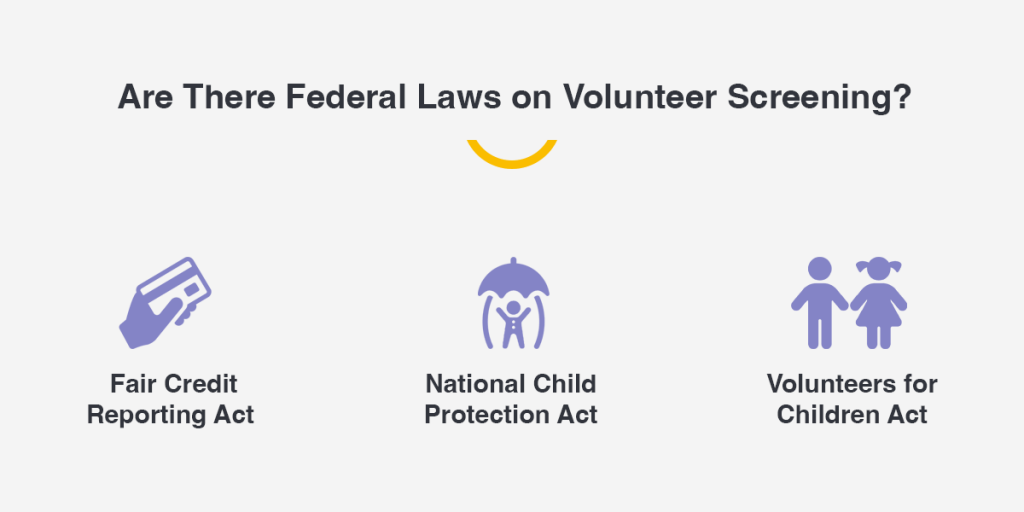Volunteer screening is integral to the onboarding process across various types of organizations. Background checks and screening policies help you maintain a safe working environment and retain your brand’s reputation.
The challenge is that background checks involve a lot of paperwork and processes, which can lead to human errors. It’s crucial to eliminate report inaccuracies and store the information at a secured location to avoid confidentiality breaches during and after the process. A reliable screening provider, like Verified First, can help with these concerns.
Why Are Volunteer Background Checks Important?
Volunteer background screening helps with regulatory compliance, improves safety, and helps protect your organization’s brand, image, and reputation. It helps improve the organization’s overall growth and development, enhances operational efficiency, and saves money by mitigating lawsuits. Learning about your volunteers’ history enables you to assess their reliability and trustworthiness. It helps you avoid embarrassment, especially if someone hides damaging past conduct from you.
Your organization can benefit from volunteer screening as it:
- Improves public safety.
- Ensures regulatory compliance.
- Limits civil and criminal liability.
- Reduces losses.
- Preserves your reputation.
- Maximizes productivity.
Is Volunteer Background Screening Mandatory?
While screening is a necessity for many organizations today, volunteer background check requirements depend on the job or role in question. While some are mandatory, others are not. For example, hospital volunteer positions typically require a criminal background check.
Organization-specific policies may also require additional screening as a precondition for employment or volunteering. For example, school districts such as Portland Public Schools (PPS), District of Columbia Public Schools (DCPS), and Northside Independent School District (NISD) require background checks for their volunteer recruits.

Are There Federal Laws on Volunteer Screening?
Several federal laws govern volunteer screening. While protecting public health and safety is crucial, the individual’s right to privacy is equally important. The rules provide clear guidelines for accessing and gathering information to maintain balance. The following are classic examples of federal laws governing volunteer screening:
1. Fair Credit Reporting Act
In addition to helping banks and financial institutions perform due diligence, the Fair Credit Reporting Act (FCRA) also applies to collecting records for volunteer activities. Organizations requesting information under the Act must do so through a third-party screening company.
2. National Child Protection Act
The National Child Protection Act (NCPA) lets schools, youth organizations, and daycare centers access the Federal Bureau of Investigation’s (FBI) criminal record files. This access creates an avenue for weeding out unreliable and harmful individuals. However, access requires authorization from the state, and some states have yet to make laws enabling nonprofit organizations to obtain these records.
3. Volunteers for Children Act
An amendment to the NCPA, Public Law 105-251, provides a way for organizations to access federal criminal records even if there are no specific state laws. This amendment, also known as the Volunteers for Children Act, applies to organizations that serve children, people with disabilities, and the elderly.
Instead of accessing the documents directly, volunteer organizations can request national criminal fingerprint background checks through a state agency. The state agency will determine if the organization is a qualified entity before forwarding the request to the FBI.
Are There State Laws on Volunteer Screening?
Multiple state laws also regulate volunteer screening. While some overlap the federal regulations, others play a complementary role.
Generally speaking, states may have additional requirements regarding record retention, information safeguards, and access to criminal records. There are also several common law principles relating to volunteer screening, whether direct or indirect. They cover areas such as:
- Invasion of privacy.
- Breach of confidentiality.
- Defamation.
- Negligent hiring.
- Wrongful interference with an employment relationship.
What Are the Types of Volunteer Screening?
There are many types of background checks, including the following:
- Volunteer identity verification background checks
- Criminal background checks
- Employment history
- Sex offender registry
- Immigration records
- Social media posts
- Civil court actions
- Drug and alcohol test
- Motor vehicle checks
- Credit history
What Are Volunteer Screening Best Practices?
Here are some guidelines to help you conduct successful background checks:
- Review applications carefully: Applications are usually your first introduction to new volunteer recruits, so it’s crucial to review them carefully. If you notice anything unusual, note it down and probe further. You may be able to begin with a simple online and social media search, depending on the nature of the role.
- Ask questions: You can gain further insight into a volunteer’s history during their interview. Be confident and ready to ask questions. In addition to their answers, observe their reactions and responses to your questions. Their tone and body language may give you some insight into their answers.
- Verify all references: References are essential sources of information regarding a candidate’s history. Request current references from academic, professional, or personal sources. Confirm the referrer’s identity and status to ensure they are also credible.
- Screen based on the role, not the individual: If a role requires a background check, make no exceptions when screening candidates. Conducting background checks on everyone regardless of age, gender, race, or social status will help avoid unintentional bias and eliminate surprises.
- Learn more about volunteer background checks: The more you expand your knowledge of background checks, the easier it will be for you to understand the requirements and processes. It helps you know which reviews are necessary for a particular circumstance and how to conduct them. It also enables you to identify high, medium, or low risks.
- Clearly explain the policies: Inform potential volunteers why there is a need to conduct background checks. Explain any regulatory and policy requirements in straightforward language and ensure you cover the fundamentals.
- Put it in writing: It’s essential to document everything during the screening process. Use a volunteer background check form containing relevant information about the checks you’ll conduct to obtain the volunteer’s consent.
- Go beyond fingerprint checks: Supplement fingerprint history checks with additional name-based searches. These searches allow you to gain more comprehensive, robust, and accurate records.
Try Volgistics Volunteer Software Today
Volunteering screening involves a lot of paperwork and demands time and effort. It also requires you to collect and retain sensitive documents. Human errors sometimes lead to inaccuracies, delays, and breaches of confidentiality. Volunteer background screening software is the most efficient and productive way to conduct and manage background checks. It employs advanced software to receive and store documents securely, allowing you to focus on other vital operations.
Volgistics offers the best volunteer management solutions across various industries. Our dedicated support team enjoys helping volunteer leaders achieve their goals with cutting-edge technology. Our partnership with Verified First enables us to provide an efficient and straightforward background screening tool that automatically contacts the volunteer for other needed information, all within the Volgistics software. Sign up for the 30-day free trial or schedule a live demonstration today!


